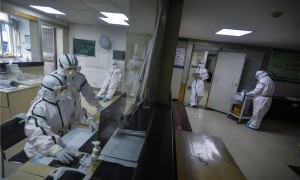President Xi Jinping's two-day visit to the Republic of Korea from July 3 will be a landmark in the history of China's diplomacy and the development of China-ROK relations. this is the first foreign visit by Xi as president that targets only one country and breaks the cycle established by China's top leadership of visiting the Democratic People's Republic of Korea ahead of the ROK. It also shows that Beijing attaches great importance to the development of China-ROK relations and hopes to use this opportunity to elevate bilateral relations to a comprehensive strategic partnership.
Since the United States announced its "pivot to Asia" policy, shifting its strategic focus to the Asia-Pacific, the disputes in the South China Sea and the East China Sea have intensified, complicating the security environment in the region. As a result, China has been compelled to pay greater attention to national security and the Third Plenum of the 18th Communist Party of China Central Committee decided to establish a State security committee with Xi, general secretary of the CPC Central Committee, as the chairman.
China is now focusing both on domestic and international security issues because it faces unprecedented challenges from internal as well as external sources. China needs a stable Korean Peninsula to secure its national interests. Since escalating tensions on the Peninsula could affect China's political security, it is committed to strengthening strategic cooperation with the ROK. This is the new security concept that China adheres to in order to make the Beijing-Seoul relationship of friendship, sincerity, mutual benefit and inclusiveness a model for the region's diplomacy.
Unfortunately, the Cold War mentality still prevails in Northeast Asia, which, together with the US' strategic rebalancing toward the Asia-Pacific and Japan's right-leaning politics, has given rise to territorial and maritime disputes and rising nationalism in the region. Under the current complicated political situation in Northeast Asia, a peaceful force is urgently needed to strike a balance among all parties and resolve the contradictions. China and the ROK can come together to become that peaceful force.
The DPRK nuclear issue has been the focus of stakeholders in Northeast Asia over the past two decades and the differences among them led to the suspension of the Six-Party Talks. China advocates resolving the DPRK nuclear issue through peaceful talks and hopes the DPRK would cooperate to make this possibility a reality, albeit with the help of the ROK.
It is equally important for China and the ROK to deepen their cooperation in exploring and gathering more evidence on Japan's history of aggression to expose the lies being uttered by the current band of Japanese leaders.
Xi's visit to the ROK is a major opportunity to strengthen China-ROK relations. The practice since 1992, when China and the ROK established diplomatic ties, shows that strengthened China-ROK ties will not affect the development of China-DPRK relations. On the contrary, by strengthening its relations with Seoul, Beijing could put benign pressure on Pyongyang to help resolve the nuclear issue. Better China-ROK and China-DPRK relations will also promote interactive relations among countries that are eager to lift the Cold War shadow from Northeast Asia. Therefore, China and the ROK can work together to inject more positive energy in the regional peace process.
The key to resolving the DPRK nuclear issue, however, is the relationship between the US and the DPRK. Of late, there have been some positive changes in Japan-DPRK ties, and only if US-DPRK relations develop on similar lines can the Peninsula nuclear issue be resolved.
An important external condition that influenced China to embrace reform and opening-up more than three decades ago was the improvement in the relations between countries of the two camps divided by the Cold War, as well as the improved ties between Beijing and Washington and the establishment of diplomatic ties between Beijing and Tokyo. This historical experience, if put to use today, can help resolve the DPRK nuclear issue and improve the DPRK's economic and development environment.







